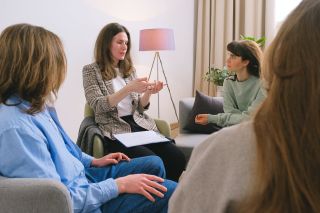Autism
The Power of Group and Belonging for Autistic Adults
Personal Perspective: Autistic people can find healing in support groups.
Posted December 1, 2023 Reviewed by Ray Parker
Key points
- Autistic people need safe spaces to be their authentic selves.
- Group therapy that encourages unmasking and self-love can be vital for autistic people.
- More peer-led support groups for autistic adults are needed.

I always knew there was something wrong with me. As long as I can remember, I have felt that I was not like everyone else.
When I was young, I didn’t even really feel human. When I was a child, my mother always told me I was born talking too much. I was born defiant and difficult, with my fist raised in protest. I never ate right or dressed right. The word “difficult” was my mother’s favorite word to describe me, and sometimes still is.
In school, I was told I talked too much. The other children made fun of me. I had no real friends. I was isolated and shunned.
This feeling of otherness haunted me my entire life. Sometime in college, I decided I was tired of feeling like a freak, and I began working as hard as I could to mimic the life, behavior, clothing, facial expressions, and persona of what I perceived to be normal. This required a tremendous amount of effort. I often slipped and would be told I was pretentious, too much, or too weird.
Life was a constant battle to try to be what the world wanted, and I always fell short. My husband reminded me constantly that people disliked me; I was an inadequate doctor’s wife because I couldn’t socialize properly and I couldn’t maintain relationships. I had trouble holding jobs and was often conned and duped. I was mocked for my naivete. The evidence of my freakishness was everywhere.
I was diagnosed with autism four years ago. Suddenly, everything fell into place. I knew what I was and could offer myself self-compassion and understanding. I was thrilled and went out into the world and tried to be myself.
I thought that with this piece of the puzzle, I could finally find compassion and love. I was a divorced woman in my 40s with no friends, and I thought that now that I understood why I was such a weirdo. I could explain it to people and find the love and support I had always wanted.
It didn’t play out this way. Friendships still failed. People still called me pretentious and found me off-putting. Love interests said I was “too much” and drifted away.
Last spring, I started a support group at Tree of Life Behavioral Health for autistic adults. It was free. It was peer-led, and I let others take over leadership sometimes.
At first, it was small, but it grew exponentially. I knew I could never be a full member. I could never trauma dump or bare my soul. I was a therapist, and a significant number of the members had been my clients at one point or another, but just being in the group was the most healing and therapeutic experience in my life.
In the group, I could talk about what it felt like to be autistic, and people understood. I could open up and not be called “too much,” difficult, pretentious, etc. People understood, and I understood them. We talked about our hyperfixations and passions.
Group topics would drift from Dungeons and Dragons to physics, plants, sloths, neurology, and video games. We would lose ourselves in those hyperfixated infodumps that normal people find “pretentious” and know-it-allish. We could stim openly. I could bounce my legs, play with fidgets, repeat myself.
We didn’t have to make eye contact. We could discuss the difficulties of trying to find relationships and finding acceptance. It was like we were cats living among dogs, and we had finally found other cats to sit with without the demands of being anything but what we were. It was magic.
This wasn’t group social skills training. This wasn’t the type of therapy where we were forced to learn to socialize like normal people. This was a place where we could finally be ourselves and not be hated for it and not hate ourselves for it.
The group still meets every Thursday night at Tree of Life Behavioral Health. There are now over a hundred official members. Many people don’t come to the in-person group. That can be too much for us.
We have an online group that stays active through discord. We have a teen group. We have a Dungeons and Dragons night. People in the group tell me all the time that the group has helped far more than any therapist or treatment. It has helped members understand themselves and their autism and find safety in a world that hasn’t offered any real understanding or validation.
Many people in the group have had family members tell them they don’t believe they are autistic or family members who think autism is an “excuse.” Many people in the group have struggled to find stable employment and relationships in a hostile world. Many have been victims of violence and abuse. Many have been severely bullied as children, but now we all know that we have a place of our own.
I did a literature review looking for peer-reviewed articles and research articles that could document the power of belonging, unmasking, and finding a place to be your authentic self in a support group for autistic adults. I found numerous articles written by neurotypical psychologists documenting that social skills groups could teach us to act more normally.
I am not the only autistic person who has found groups of autistic people to be the answer. If you look online, numerous YouTubers, social media influencers, and other autism self-advocates have spoken up about the power of unmasking in groups of autistic people. Yet, the clinical community remains behind.
It is my goal to change this. Every community should have a group or safe place for autistic people to be themselves. Autistic people are some of the most remarkable people I have ever met.
They are engineers, doctors, psychologists, and artists, changing the world. We deserve communities where we can find validation and love for being exactly who we are.




